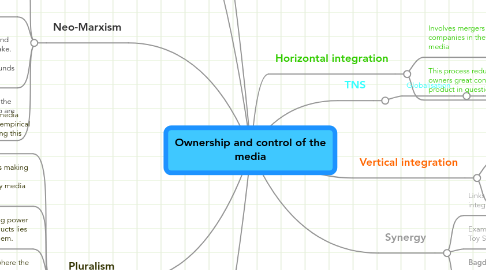Ownership and control of the media
by Dominic Frimpong


1. Diversification
1.1. Is a trend in media ownership towards owning a variety of media products or even moving out to businesses other than media types.
1.2. An example is AOL. They own organisations including television, film companies, record label and more.
2. Concentration
2.1. Is a trend towards the media being owned by a smaller number of organisations
2.2. Media companies have become larger by buying up small companies or merging with others.
2.2.1. An example is Rupert Murdoch who owns a number of newspapers.
3. Marxism
3.1. It is where power and control lies in the media with the ruling class.
3.2. Marxist used the term ideology to explain ruling class.
3.3. Miliband - Wrote from a marxist perspective and argued that the ruling class uses the media to control society by creating a false picture of society presenting capitalism as positive.
3.4. Evaluation - The views of the ruling class can be seen as conspiratorial.
3.5. Evaluation - Their capitalistic approach can mean that owners can come into conflict with others.
3.6. Evaluation - Negrine - Because their business owners their main concern is that they want to be commercially successful.
4. Neo-Marxism
4.1. It is the analysis of social inequalities beyond social class, to cover other disadvantaged groups including those based on gender, ethnicity and sexuality.
4.2. The term hegemony is used to describe the certain set of ideas which dominate the media ( the same idea). It runs through institutions such as education and religion.
4.3. Media professionals reinforce capitalist hegemony. Neo-Marxists are interested in the way the background of media professionals influence the choices they make. They contend most media professionals are white, middle class come from similar educational backgrounds and so share a similar worldview.
4.4. Evaluation - Neo-Marxism fails to recognise the growing number of media professionals who are women and/or from ethnic-minority backgrounds.
5. Pluralism
5.1. Is a view usually supported by media professionals, but there is little empirical research to cite when considering this perspective.
5.2. Media professionals are regarded as making professional judgements and acting responsibly to produce good-quality media products.
5.3. pluralists see the audience as having power because the success of media products lies in the hands of those consuming them.
5.4. this is supply and demands where the media supply what the consumers want.
5.5. Where marxists are critical of the trends in media ownership, pluralists believe they can bring positive benefits to the consumer.
5.6. Evaluation - Marxists argue that pluralists ignore the role of owners in shaping the content of the media.
5.7. The concept of the fourth estate has been used by pluralists to describe rhe positive role that the media can have in protecting democracy.
6. Vertical integration
6.1. Is a trend towards all the stages in production, distribution and consumption owned by one company
6.2. An example is Disney who owns films, distribution companies, television companies and more.
7. TNS
7.1. Globalisation
7.1.1. Companies operate on a global status
8. Horizontal integration
8.1. Involves mergers or takeovers of companies in the same section of the media
8.2. This process reduces competition and gives owners great control of the market for the product in question
8.2.1. An example is Rupert Murdoch who owns the news cooperation.
